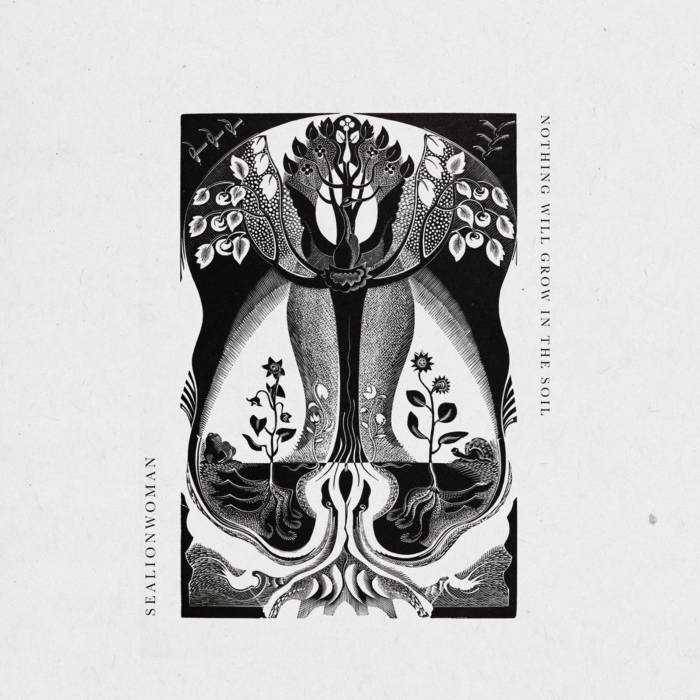The Sealionwoman is a mythological figure in the folklore of several northern European territories. In the Faroe Islands, she’s a kópakonan, and in Ireland, Orkney and the Shetland Islands she’s a selkie. These creatures are normally irresistible sirens who peel off their sealskin for lusty farmers, and then find themselves trapped on the mainland for long, anguished periods with no hope of return (often the selkie is coerced into marriage and has her skin stolen or hidden).
Dark fables of sex and death offer a useful place to start with Sealionwoman, the band. A London-based duo of vocalist Kitty Whitelaw and double bass player Tye McGivern, this pair are doing something entirely new by tapping into a rich seam of traditional folk. Their first album, 2018’s Siren was all at sea, and set adrift, if you will. For the followup, Nothing Will Grow In The Soil, they’ve crawled onto the dark, desiccated land, and everything is firmer, harder, dryer.
It’s an idea that’s been germinating for quite some time now, though not as long as the inspiration: singer Whitelaw has developed a fascination with yew trees, and the Crowhurst Yew in Surrey in particular. It’s a tree that has stood since the Bronze Age, with the surroundings of St. George’s churchyard, a relative newcomer and neighbour for little more than a thousand years. Predating Christianity, this living totem of prehistory is a wonder of nature that has somehow come through the last 4,000 years, surviving a nineteenth-century hollowing and a cannon ball embedded in its side. If anything has an ancient mystical energy then this tree does, and it’s that sense of deep-rooted endurance and inscrutability that Sealionwoman taps into on this new record.
On opener ‘Two Sisters’, there’s a sense of limbo that fits both with the legend of the selkie and the lifespan of the tree – a purgatorial state that sits somewhere between long term pain and a sense of meditative acceptance. Moreover, while we’re high and dry this time, it’s not too difficult to imagine Whitelaw’s yearning, androgynous vocal acting as a beacon to McGivern’s lurching contrabass representing the treacherous drink below. Whitelaw plunders the depths of her vocal range and McGivern creates entire sonic landscapes from very little: some single, repetitive, drone-like notes, some percussion on the hollow of the body, plus some effects and loops that augment and distort the passage of play. It’s a fantastical, chimerical illusion that they create, and they’re able to largely replicate it in the live setting too, apparently.
‘Butcher’s Broom’ is like the creaking of the abyss, with the earth’s core fissuring and opening up as Whitelaw wails for forgiveness. ‘River’ offers some lighter relief, a return to their jazzier roots, a sweetener for the gut wrenching drama of ‘Charcoal’, where McGivern scrapes the arid terra firma and Whitelaw inhabits the vertiginous domain of a choirboy. It adds a cold sense of religiosity to an already eerie set of pagan psalms. Closer ‘Bracken’ is indebted to ancient folk while the most adventurous song on the album, ‘It Rides A Horse’, has SWANA elements as well as hints of dub. Nothing Will Grow In The Soil is a remarkable, uncompromising exposition of artistry, where the Sealionwoman has shed more than just her second skin for our benefit.


